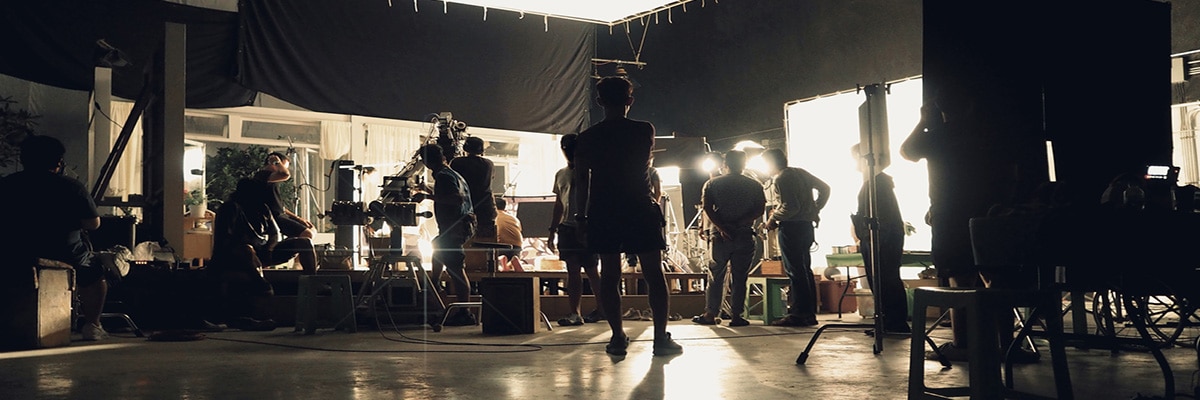
Colorado Workers’ Compensation for Movie & Film Workers
How to file a claim in Colorado after an injury on a movie or film set
The movie and film industries are booming in Colorado. According to data by Denver Arts & Venues, the state generates more than $1 billion per year from movies and their associated promotions, and the industry itself employs more than 15,000 residents.
Additionally, film is one of the fastest-growing industries in the state, with employment rising 43% in the past decade, which is well above the national average of 30% across all fields.
Common jobs on film sets
With all this growth in the Colorado film industry, you may be wondering what types of employment opportunities are available across the state. From hourly caterers to big-budget actors, there are many different roles for job seekers.
A few common positions in film production include:
- Directors
- Producers
- Assistant directors (ADs)
- Production assistants (PAs)
- Camera operators
- Set dressers
- Prop masters
- Stunt performers
- Gaffers or lighting technicians
- Sound mixers
- Stylists
- Costume designers
- Carpenters
Common accidents and injuries in film production
You’ve probably seen a few movie set injuries in the news recently. However, there are many other incidents and accidents that don’t make headlines.
On-set hazards can include everything from dangerous props to unreliable or unsecured equipment. Other common sources of injuries include:
- Wires and cables leading to slip-and-fall accidents
- Firearm discharges
- Malfunctioning pyrotechnic effects
Injuries can range from minor cuts and bruises to severe injuries, including:
- Lacerations
- Fractures
- Gunshot wounds
- Heat exhaustion
Stunts are particularly dangerous on film sets. When choreographing fights, setting off explosions, or simulating car crashes, unsafe conditions can lead to serious accidents and even fatal work injuries.
High-profile movie industry deaths
Brandon Lee’s fatal workplace injury
One of the most well-known production accidents of all time occurred during the 1993 filming of The Crow. Brandon Lee, the film’s star, was killed by a prop gun firing defective blanks. He was rushed to the hospital but died during surgery.
Since filming was largely complete, production continued with script rewrites and a body double, and The Crow went on to become a cult classic remembered as Brandon Lee’s legacy. However, it still represents negligent workplace accidents and the tragedies that can occur when safety guidelines aren’t followed.
Further tragedy: Halyna Hutchins and Rust
Almost 3 decades after The Crow, director of photography Halyna Hutchins was killed by a prop gun on the set of 2021’s Rust. While the investigation is still underway, it’s been established that a live round accidentally went off during a rehearsal. This highly publicized accident involved actor Alec Baldwin, who was holding the gun when it discharged.
Hutchins was struck by the bullet and taken to a hospital, where she later died. This tragedy serves as yet another example of how, despite being a lucrative industry, film production jobs can lead to severe accidents, injuries and even deaths.
Colorado Wrongful Death Claims—
Order of Priority
Denver injury attorney explains who is entitled to file a wrongful death claim and in what order.
Workers’ compensation in Colorado
Workers’ compensation is a special type of insurance for people who are injured on the job. It’s overseen by the U.S. Department of Labor, but each state has its own laws regarding who qualifies for benefits and how claims should be made and paid.
An important thing to know is that Colorado offers no-fault workers’ comp, which means that your employer doesn’t have to be found liable for your injury. In other words, nobody has to take the blame. You can simply be injured in the course of your everyday duties to get compensation.
Exemptions in Colorado workers’ comp
According to Colorado state law, most employers with even 1 employee must provide workers’ compensation coverage for their staff. That means that if you’ve been hurt while working on a movie set in Colorado, you’re probably entitled to benefits.
However, there are exceptions for certain types of workers, including:
- Federal employees who are covered by federal workers’ comp
- Real estate agents and brokers who work on commission
- Domestic household employees
- Ski resort employees
These workers’ comp exemptions won’t usually affect workers filing claims because of production accidents on film sets, but if you have any concerns about your eligibility for benefits, you should contact an experienced workers’ compensation attorney who can evaluate your case and explain your rights.
Types of workers’ compensation benefits
Workers’ compensation can look different for everyone, but typical types of compensation include the following:
- Medical benefits. These include payments for all necessary medical expenses like doctor appointments, medications, surgeries, rehabilitation, and medical supplies and equipment.
- Lost wage benefits. These provide workers with two-thirds of their average weekly wage while they are unable to work due to their injuries. The length of time workers can receive these benefits varies according to their disability.
- Death benefits. In the case of a fatal work injury or illness, the dependents of the deceased are entitled to receive death benefits for lost income and funeral expenses.
How to file a workers’ compensation claim in Colorado
There are 4 or 5 steps to filing a workers’ comp claim in Colorado.
- Seek medical attention.
- Report your injury.
- Verify that your employer reports your injury to their insurance agency. They are required to do this within 10 days.
- Wait to hear back if your claim has been accepted or denied. This typically takes 20 days.
- Appeal a denied claim.
It’s a straightforward process, but there can be many complications along the way. For example, you typically only have 10 days after your accident to submit a written report about it to your employer. Additionally, when you seek medical care, it must be from an approved physician under your employer’s insurance coverage for workers’ comp, unless it’s a medical emergency.
Because of the many pitfalls that exist with filing a workers’ comp claim in Colorado, it’s highly recommended that you contact an experienced workers’ compensation attorney to assist you with the process.
Filing a workers’ comp claim in Colorado as a non-resident
If I live outside of Colorado, can I file a workers’ comp claim in Colorado if I’m injured on a Colorado movie set?
The answer is usually yes, but jurisdiction can be tricky when it comes to workers’ comp since every state has its own laws. In Colorado, out-of-state residents seeking workers’ comp are subject to the Perryman test, a test conceived out of the landmark 1957 case Denver Truck Exchange vs. Perryman.
To get workers’ compensation in Colorado as a non-resident, you’ll need to meet 2 out of the following 3 requirements:
- Your employment contract was created in Colorado.
- Your employment contract wasn’t created in Colorado, but you were employed in Colorado at the time.
- You’ve participated in “substantial employment” in Colorado.
Since the first 2 clauses represent an “either/or” scenario, both will require you to have had substantial employment in Colorado before your injury.
Contact a Colorado workers’ compensation attorney
If you’ve been injured or developed an occupational illness after working on a film or movie set in Colorado, you’re entitled to compensation while you recover from your injuries. Unfortunately, the workers’ comp claim process can be complicated, and employers and their insurers often try to take advantage of workers without legal representation.
At The Babcock Law Firm, we’ve committed to helping injured Coloradans get the compensation they deserve. Let our experienced workers’ compensation attorneys handle the negotiations with your employer and their insurance company so you can focus on healing.
Contact us today for a free consultation of your case.


